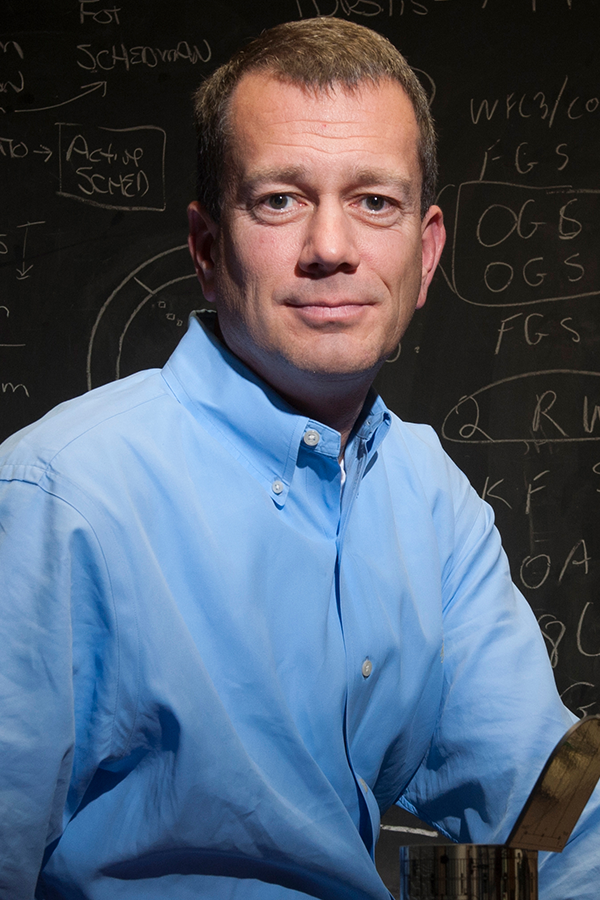
David Haskins
Mission Operations Manager
David Haskins credits his parents for his interest in space. “My dad was a science teacher,” David recalled. “I remember that when I was young, he would take high school students to the top of a hill behind our house to view planets with his telescope. My mom was also interested in astronomy, and she was always showing me different constellations. Together we followed many of NASA’s early space exploration missions. Because of my parents’ interest in astronomy, I became fascinated with space and exploration.”
Born in Wellsville, New York, David graduated from Alfred State College with an associate’s degree in engineering science. He then earned his bachelor’s degree in aerospace engineering from the University of Buffalo. “I was always interested in astronomy as well as aeronautical engineering so I decided to get my degree in aerospace engineering,” he said. “The marriage of the two seemed like a good fit for my interests.”
After graduating from college in 1988, he obtained his first engineering job at Johnson Space Center in Texas, working on the space shuttle program. While in Houston, David was involved with the operational aspects of integrating “payloads,” or cargo, into the space shuttle.
Putting an object into the space shuttle is a lot more complicated than loading up a truck with boxes. David collaborated with astronauts and payload customers to develop procedures for the operation and deployment of major spacecraft from the cargo bay and for the operation of what are called “in-cabin payloads,” such as the science experiments conducted aboard the shuttle and the shuttle’s use of the IMAX camera. He worked to make sure that operating these payloads were safe for both crew and shuttle. Payloads need to have access to power, communications and data processing on the shuttle, so David made sure those elements were safely connected while also developing the rules for operating them. He also helped create items like the spacecraft system displays that the astronauts would use, and the ground system displays that engineers would use from Earth.
In 1990, David provided this support for the Hubble deployment mission. Three years later, he also supported the historic first Hubble servicing mission.
“During the mission you are working to a timeline and you always have to keep in mind the safety of the crew, but the efficiency as well. You’re always thinking ahead to the what ifs and what’s next in the plan, so you’re ready to respond to any question they have on orbit or any problems that pop up,” he said. “When it all comes together in the end, it's very satisfying and you feel like you have a great sense of accomplishment from all the hard work that goes into the preparation for years beforehand. The mission seems to go by in a flash because you’re busy 100 percent of the time.”
While at Johnson, David met his wife, who also worked in the shuttle program. Two years later, when David decided to move back east, he accepted a position at Goddard Space Flight Center in Maryland as a systems engineer for Hubble’s electrical power system, part of the team responsible for the health and safety of Hubble’s electrical system. He worked on Hubble for 14 years and supported the next four servicing missions, which would involve the replacement of electrical system-related items that included Hubble’s batteries, solar arrays and the power control unit.
He then moved to the Landsat Data Continuity Mission as a systems integration and test engineer, where he provided technical leadership and coordination. “I decided I wanted to see what else is out there besides Hubble,” David said. “But I couldn’t stay away.”
After two years, he returned to Hubble as the Deputy Operations Manager, and was quickly elevated to the role of Operations Manager. In that position, he is responsible for maintaining the health and safety of Hubble and ensuring that the data recorded on Hubble makes it safely to the ground and transferred to scientists without any information being lost along the way.
The role is a good fit, allowing him to use his technical expertise while still managing a team of people, he said. “All the experience adds up along the way,” he said. “I guess you never know where you’re going to end up, but you try to guide yourself with positions that you take. If you have a dream, try to pursue it as rigorously as you can. Some students don’t know exactly where they want to go or want to do, and that’s OK, too. As you gain your experience as a professional you figure that out.”
David has a private pilot’s license, and enjoys playing soccer and cycling. He and his wife live in Maryland, and have three sons.

